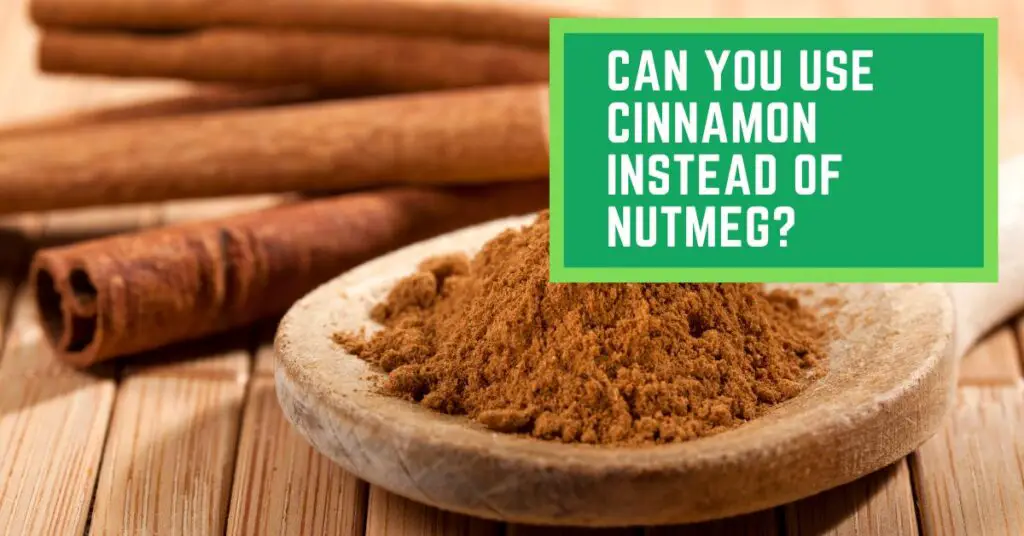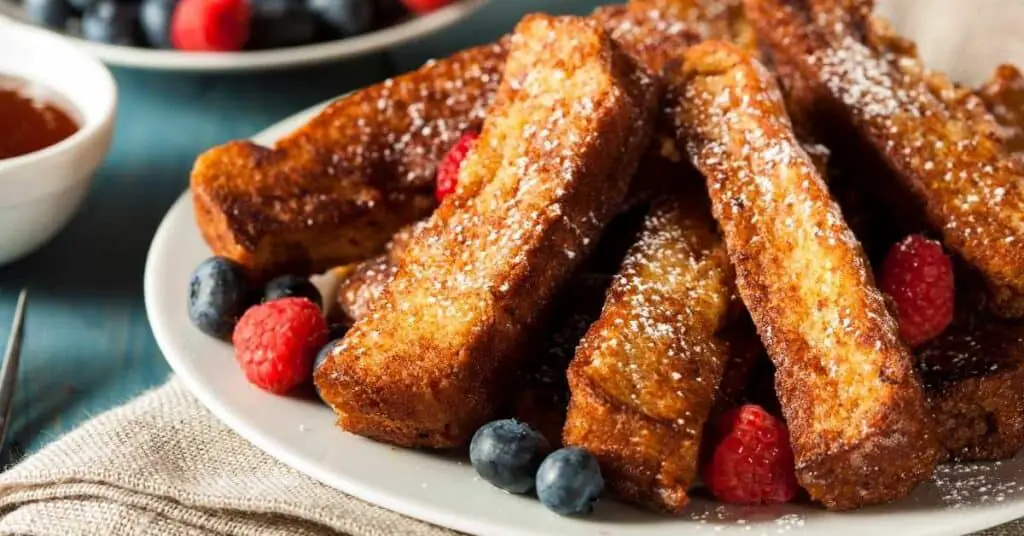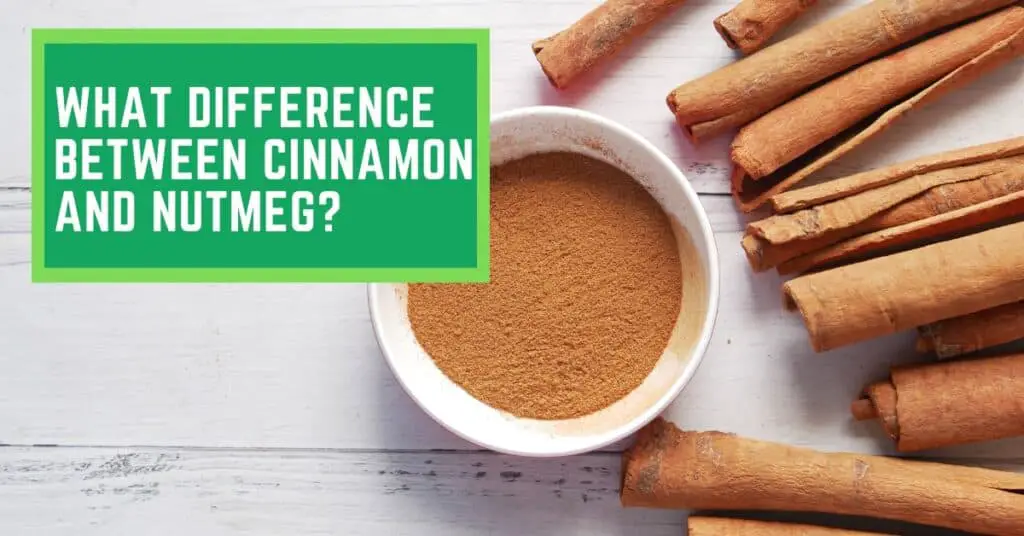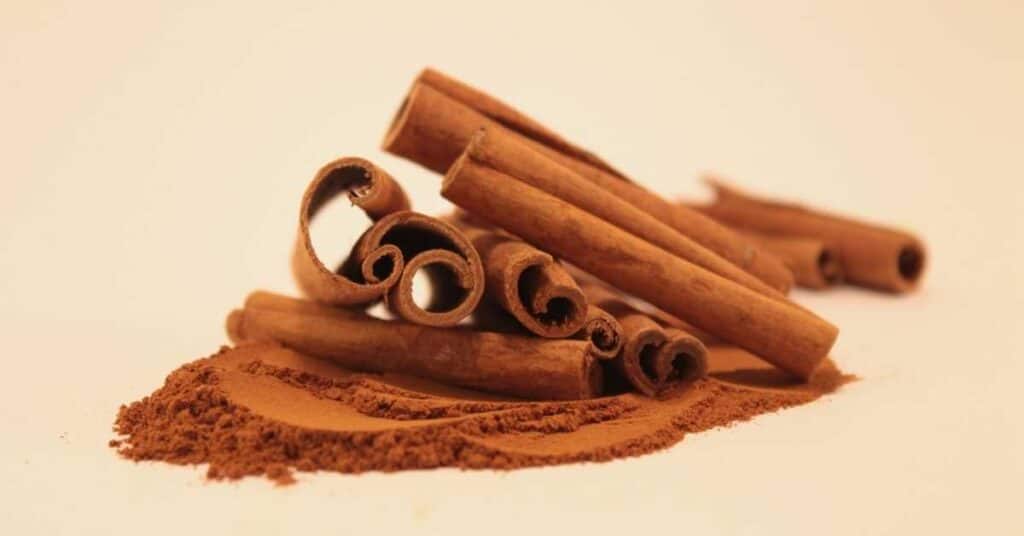If you’re like most people, you probably have a spice cabinet that’s stocked with all the basics-salt, pepper, cinnamon, oregano, basil, and, of course, nutmeg.
What if you suddenly notice that you are out of nutmeg and try using cinnamon instead?
Generally speaking, you can use cinnamon instead of nutmeg and vice versa. Even though they may taste similar, there are some subtle differences between the two spices that you should be aware of.
Want to find out more about using cinnamon instead of nutmeg?
Read this article to learn more about the nature of cinnamon and nutmeg, how cinnamon differs from nutmeg, and some of the best substitutes for nutmeg.
Can You Really Use Cinnamon Instead of Nutmeg?
If you’re out of one of your baking staples, can you use the other as a substitute? Not always!
In this case, you are in luck! Cinnamon and nutmeg are both spices that come from trees. Cinnamon is made from the bark of a tree, while nutmeg comes from the tree’s seed.
Cinnamon has a warm, sweet flavour that goes well in baked goods like cookies and cakes. Nutmeg has a similar flavor, but it also has a bit of a bite to it.
So if you’re out of nutmeg and need to use cinnamon as a substitute, use more of it than you would cinnamon.
Start with 1/2 teaspoon of cinnamon for every 1 teaspoon of nutmeg called for in the recipe. You can always add more cinnamon if you want a stronger flavour.
What is Cinnamon?
Cinnamon is a spice made from the inner bark of certain trees in the genus Cinnamomum.
It is used in both sweet and savoury dishes and is one of the most popular spices in the world.
Cinnamon is available in many forms, including cinnamon sticks, ground cinnamon, and cinnamon oil. It has a sweet and woody flavour with hints of cloves.
Today, cinnamon is still used in many cuisines around the world. It is a common ingredient in Indian curries, Chinese five-spice powder, and Moroccan tagines. Cinnamon is also used in baked goods such as cinnamon rolls and snickerdoodles.
If you’re looking for a spice that will add flavour and depth to your dishes, cinnamon is a great option. It’s also relatively inexpensive, so it’s a great way to spice up your cooking without breaking the bank.
What is Nutmeg?
Nutmeg is a spice that comes from the nutmeg tree. The nutmeg tree is native to Indonesia and also found in the Caribbean. The tree can grow up to 20 meters (60 feet) tall and produces two spices: nutmeg and mace.
Nutmeg is the brown, egg-shaped seed of the tree. Mace is the lacy, red covering that surrounds the seed. Both nutmeg and mace have a slightly sweet taste with a hint of pepper.
Nutmeg is often used in baking and desserts, while mace is more commonly used in savoury dishes.
In addition to being a popular culinary ingredient, nutmeg has a long history of use in traditional medicine. It was once believed to be a cure for everything from the common cold to the plague.
Today, nutmeg is still used as a home remedy for a variety of ailments, including insomnia, indigestion, and anxiety.
Cinnamon Vs. Nutmeg
Cinnamon is a versatile spice that can be used in sweet or savoury dishes. Nutmeg is also a versatile spice, but it has a more distinct flavour that is often used in sweeter recipes.
Let’s go into detail to find out more about the differences in key profiles of flavour, aroma and the types of dishes that can be used for them.
What is The Difference Between the Flavours?
Do you love the warm, spicy taste of cinnamon? Or the sweet, rich flavour of nutmeg?
Both spices are commonly used in baking and cooking, but what is the difference between them?
Cinnamon is made from the inner bark of a tree called Cinnamomum. It has a sweet, woody flavour with hints of citrus. Nutmeg, on the other hand, comes from the seed of a tree called Myristica. It has a sweet, earthy flavour with hints of pepper.
So, what is the difference between the flavour of cinnamon and nutmeg? Both spices have a similar sweetness, but cinnamon has a sharper, more pungent flavour, while nutmeg is earthier and sweeter.
Cinnamon is also more commonly used in savoury dishes, while nutmeg is used more often in sweet dishes.
If you’re trying to decide which spice to use in your next recipe, think about the other flavours you’re using.
If you want a warm, spicy flavour, go for cinnamon. If you want a sweeter, more mellow flavour, go for nutmeg. And if you can’t decide, why not use both?
What is The Difference Between the Aromas?
Cinnamon is made from the inner bark of a tree in the genus Cinnamomum. There are many different species of cinnamon trees, but the most common type used for commercial purposes is Cinnamomum Verum or true cinnamon. When the bark of this tree is dried and rolled into sticks, it produces a sweet aroma.
Nutmeg, on the other hand, is made from the seed of an evergreen tree in the genus Myristica. The most common type of nutmeg tree is Myristica fragrant. The seeds of this tree are dried and then ground into a powder, which produces an earthy aroma.
So, what is the difference in aroma between cinnamon and nutmeg? Well, cinnamon has a sweeter, more warming aroma, while nutmeg has a more intense, earthy aroma.
What is Used For What Dishes?
When it comes to spices, there are a few that are essential to have in your cupboard. Two of the most popular and versatile spices are cinnamon and nutmeg.
Both of these spices can be used in sweet and savoury dishes, and they each have their own unique flavour. So, what’s the difference between cinnamon and nutmeg? And what dishes are best suited for each spice?
Cinnamon:
– Desserts like pies, cakes, and cookies
– Breakfast dishes like oatmeal and pancakes
– Curries and stews
Nutmeg:
– Desserts like pies, cakes, and cookies
– Soups and sauces
– Meat dishes like roast beef or pork loin
When it comes to spices, there are a few that are essential to have in your cupboard. Two of the most popular and versatile spices are cinnamon and nutmeg.
Both of these spices can be used in sweet and savoury dishes, and they each have their own unique flavour.
What are Other Substitutes for Nutmeg?
Other than cinnamon, there could be other substitutes for nutmeg. The following are some of the other potential substitutes:
1. Mace: Mace is the nutmeg kernel’s outer covering.It has a slightly more bitter flavour than nutmeg, but it can be used as a substitute in many recipes.
2. Allspice: Allspice is a spice that tastes like a combination of cloves, cinnamon, and nutmeg. It can be used as a substitute for nutmeg in many recipes.
3. Garam Masala: Garam masala is a blend of spices that typically includes cardamom, cloves, cinnamon, cumin, and black pepper. It can be used as a substitute for nutmeg in many recipes.
Related Matters
01. What does nutmeg add to a recipe?
Nutmeg is a great addition to recipes because it has a sweet, nutty taste that can really enhance the flavour of a dish.
It’s especially good in baked goods, like cakes and cookies, but can also be used in savoury dishes, like stews and curries.
Nutmeg is also a good source of minerals like magnesium, potassium, and manganese. So it’s not only tasty but also nutritious!
02. Is cinnamon healthier than nutmeg?
Yes, cinnamon is healthier than nutmeg. Nutmeg is high in toxins and can be harmful in high doses.
Cinnamon is a safer choice and has many health benefits, such as reducing blood sugar levels and helping to fight against diabetes.
03. What do cinnamon and nutmeg do for the body?
Cinnamon and nutmeg are two spices that offer a range of health benefits. Cinnamon can help to regulate blood sugar levels, while nutmeg is a good source of antioxidants.
Both spices also have antibacterial and anti-inflammatory properties.
In terms of specific benefits, cinnamon has been shown to help lower blood sugar levels, reduce inflammation, and improve cognitive function.
Nutmeg, on the other hand, is good for digestion, tackling insomnia and relieving pain.
So, if you’re looking to add a little something extra to your health regime, why not try incorporating cinnamon and nutmeg into your diet? You might just be surprised at the difference they make!












